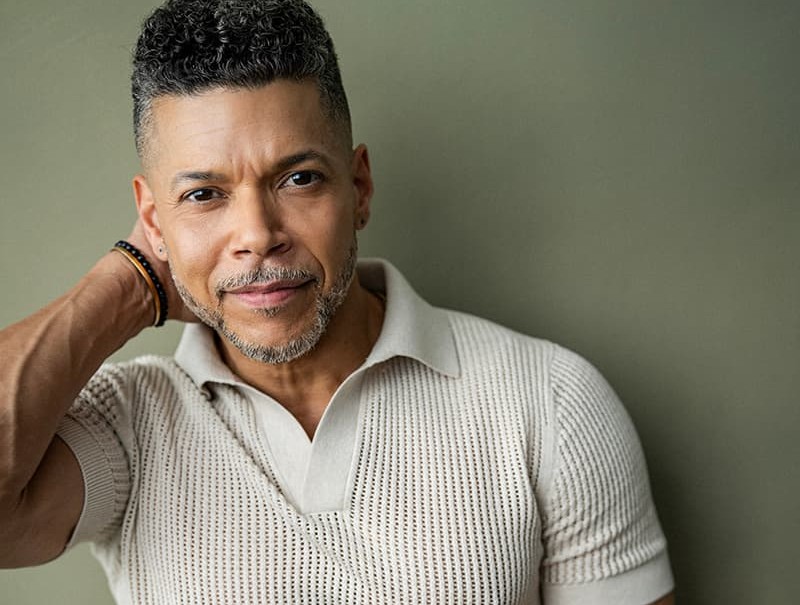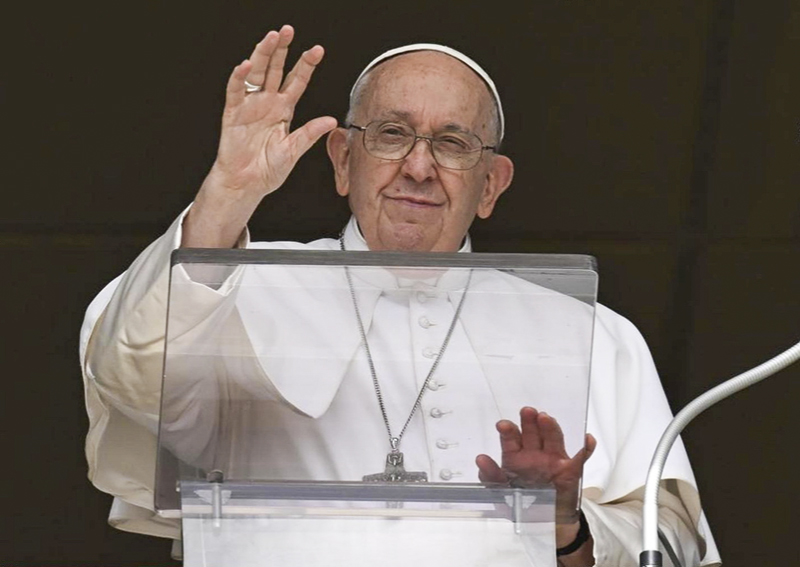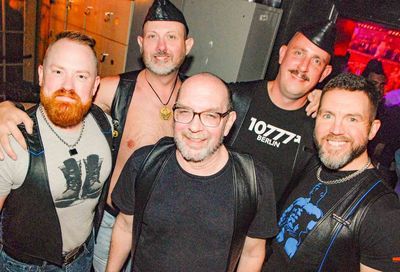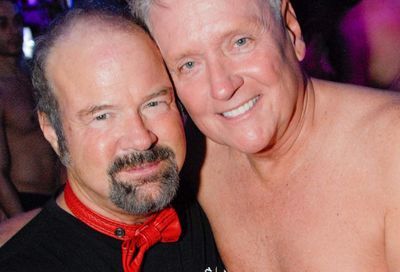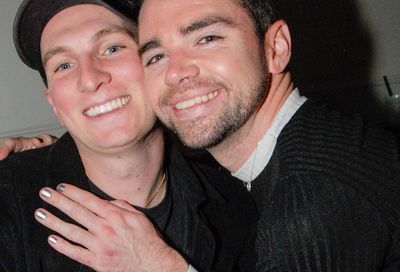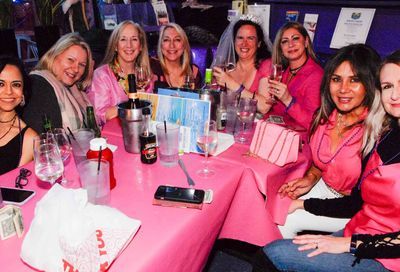Wrestling with the Truth
The journey from ''David'' to ''Donna'' taught Donna Rose lessons about life that she's eager to share
Some people are very guarded when it comes to their personal space. Donna Rose is not one of them. Instead, she likes to hug. Her embrace radiates a warmth of spirit. It’s not, however, the only form of body contact she’s mastered. In the proper context, she could likely have you flat on your back on a wrestling mat as the referee blows a whistle announcing her win.
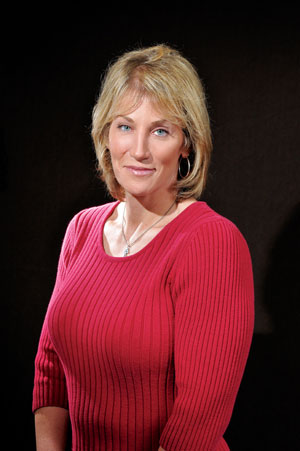
Donna Rose
(Photo by Todd Franson)
It’s a little something she perfected years ago, growing up in upstate New York as David.
”There was a long time in my life where if I had to use three words to describe myself, one of them would have been wrestler,” she explains. ”I realized I could hide behind what society expected from me as a boy. By building a masculine physique and doing masculine things, I would never have to deal with people’s ignorance or suspicions.”
Eventually, however, she could no longer hide from the truth. At 40, as a husband and father living in Arizona, David had to begin the transition to Donna. Today, at 51, that journey has taken her from multiple organizations – from the Gay and Lesbian Alliance Against Defamation (GLAAD) to the National Center for Transgender Equality. She’s written a memoir, Wrapped in Blue: A Journey of Discovery, spoken to audiences across the country, and told her story to many media outlets.
Of course, there have been bumps. For example, many first learned of Rose when she made her very public split from the Human Rights Campaign in 2007, resigning from the board over the organization’s decision not to actively oppose a version of the Employment Non-Discrimination Act (ENDA) that did include protections for transgender people.
Another bump, thankfully, was nipped in the bud just last year: in situ melanoma.
The journey includes a transcontinental relocation that has – as of just a few days ago – put Arizona’s Rose into the middle of Pennsylvania.
And it has included a round-trip that returned Rose to her beloved wrestling mat earlier this year, competing in the ASICS U.S. Open Wrestling Championships in Cleveland.
”When I transitioned, I always assumed that those days were behind me,” says Rose, explaining how she returned to the sport four years ago as an openly transgender woman. ”It sounds strange to say that I’m a 51-year-old transsexual woman wrestler, cancer survivor, single parent…. There are so many things that come into play with who I am.”
Who Rose is includes ”girlfriend,” and her new Harrisburg home puts her South Carolina companion within easier reach. Continuing her journey – this time quite literally, driving down I-95 to spend the weekend with her – Rose stopped in D.C. last Friday to spend a couple hours sharing a portion of her story. If you want the entirety of her tale, you’ll have to be patient, as Rose’s journey is a long, long way from over.
METRO WEEKLY: How are you settling into Harrisburg?
DONNA ROSE: This is the fifth day. My first day at The LGBT Center was this past Monday, so last week at this time I was driving cross-country from Phoenix, where home has been. People ask me where I live, but things have been so frenetic in my life in recent months that I tell people my furniture lives in Phoenix and I visit it from time to time.
The way I typically do things is that I want to make sure it’s a good fit. And there was so much to do in such a short period of time – it all happened in two to three weeks. The logistics of moving was impossible for me to manage, just getting myself out here. I’m living in a hotel room at the moment, but I’ll make more permanent accommodations shortly.
MW: Tell me about the job.
ROSE: A number of organizations came together as a ”Community Center Coalition” and I’m their first executive director. They have a board, they’re growing, and so it’s a very exciting opportunity for me because many of the things I’m passionate about are part and parcel of what I get to do on a daily basis – which I’ve always done. But up till now it’s been as a volunteer or it’s conflicted with my career, which has been problematic for me.
MW: What’s the scope of the coalition?
ROSE: This is all central Pennsylvania, eight counties, so about 2.5 million people. The interesting thing is that Harrisburg, and Pennsylvania in general, have the third largest rural population [in America]. How do you then reach out to LGBT people, LGBT youth, that are so disparate over eight counties in a rural setting? It certainly provides a number of challenges, but also a number of opportunities. I’m very excited about both, actually.
There are a number of reasons it’s good for me. Part of it is the proximity to D.C., because for a long time I’ve felt that somehow or another I would end up in or around D.C. It’s close to family in upstate New York. It’s close to friends that I’ve got here in D.C. and Pennsylvania. It’s a culture shock for somebody who has made a lifestyle choice about open-toed shoes and flip-flops, but I’ve become a poster child for change in recent years so this is just another chapter in that regard.
MW: Your website, donnarose.com, looks like it hasn’t been updated in a while. I’m wondering if you’ve been preoccupied.
ROSE: Well, I’m always preoccupied with something. But the irony is that when I started to transition from David to Donna – about a dozen years ago – the thing that was singly most transformative to me was the Internet, because growing up as a seemingly heterosexual middle-class white guy in a culture that gives that particular caste a number of privileges, I really had never experienced discrimination, which is one of the reasons why I’ve become what others would call an activist. When I transitioned, I felt a very strong need to give back. The initial way I did it was through my website. But then I started my blog back in 2004, and the irony is that I started updating my blog so much that I didn’t update the website all that often.
MW: Speaking of preoccupations, with this new job do you still have time to continue your consulting work, your speaking engagements regarding transgender advocacy?
ROSE: I do. One of the reasons I found the opportunity in Harrisburg to be a good fit wasn’t simply because I find the work to be so important and so fulfilling, but because they are very supportive of my ongoing speaking, visibility, and the things that I’m passionate about. I’m speaking at the University of Delaware. I do a lot of corporate stuff. That will be continuing.
MW: You’ve also been involved with the National Gay & Lesbian Chamber of Commerce (NGLCC), whose national conference is this month in D.C. You served on its board.
ROSE: Yes, I just stepped off. My two years are up. I’ll be at the dinner here in a couple of weeks, but it’s kind of interesting to see how I’ve gotten involved. People seem to think that my visibility or my involvement in activism is some kind of planned path that I set out to do at some early point in my career as a trans person. My original intent was just to transition and be done. Many of us, we don’t want to deal with the stigma. We don’t want to have to explain this to people, because when people find out that you’re not what they think you are the relationships can shift fundamentally. After I transitioned – I’d been married for 20 years and my son was 14 at the time – my son didn’t want anything to do with me. So I felt that it was time to go and start a fresh life for myself, for Donna, who had lived in the shadows, who had lived in a closet for the best part of her lifetime. So I got a job at Dell in Austin and moved there as Donna.
MW: From Arizona?
ROSE: From Arizona — that’s where I transitioned. I found, slowly but surely, that I had traded one closet for another. When people came to me and asked questions like, ”Does your son live with you or with your ex-husband?” I was now not hiding Donna, I was hiding David.
So as I become more comfortable in who I was and this unique balance of multiple lives in a single lifetime, I needed closure. I wrote a book. One of the things I learned is that if you’re going to try to keep a low profile and fade into the fabric of society, don’t write a book. [Laughs.] It might seem self-evident. But it got some visibility at the Texas Book Festival and that’s the kind of thing that opened the door into the Human Rights Campaign, which is what ultimately led me into some very important and visible and emotional things in the years that followed.
MW: Since resigning from the HRC board in 2007 over ENDA, have you dealt with the organization?
ROSE: I have.
MW: Is HRC making progress?
ROSE: The question people ask me is if they’ve changed. I respond by saying that everything changes. But I will also say that if they found themselves in the same position of having to choose, I’m confident they would do the same thing again.
The legacy coming out of what happened in 2007 is that nobody wants to go back and revisit that tumult, that tear in the community. Hopefully, what we will see is that there won’t be an opportunity or effort to kind of break it apart again. But my involvement with the organization, we haven’t made up yet.
When I was on that board as the first transgender person, it was a very risky thing for me personally because there was history between the organization and the community. There were a lot of people who were saying, ”My heart goes out to the first trans person who ends up on that board, because they’re going to have to deal with a lot of history, and lot of pressure, a lot of expectation.” I never expected that it would be me.
Part of the reason that I was cynical wasn’t what happened, but how it happened, because when ENDA finally went down, I had been given assurances that I wouldn’t be left out to dry because of the risky situation I was in. I had just helped Joe [Solmonese] to come to the largest trans conference in the country and he stood in front of a thousand people and pledged that the organization would only support this fully inclusive [legislation] and he got this huge ovation.
I’m known for being a person of action more than a person of words. So for me to be put in a position where I’m completely shut out of what’s happening, where they know that I’m not going to like it, so rather than tell me and warn me, I’m just left there. After everything I had done, after all I had given, it was very difficult for me to accept from the leadership of the organization. There was a personal component to it as much as there was a disappointment that we had made, I think, a bad decision in terms of community. That’s part of what still hasn’t healed on my side of things.
But I’m very happy with the relationships that I built. I’m very comfortable that when they made the decision that they did, it wasn’t a unanimous decision by any means. I have a number of friends that are still there, and I’m comfortable that [my time on the board] had to end when it did for the reasons that it did.
MW: Looking at a group like NGLCC or an issue like ENDA, we’re indirectly talking about money. And when it comes to considerations for transgender people, fiscal considerations are huge. Transitioning is not only emotional, but a fiscal endeavor. Ballpark, how much have you paid for surgeries, on top of things such as voice lessons?
ROSE: It is a huge fiscal endeavor. Best I can tell, it’s probably been about $80,000. People just don’t stop to think about how expensive it is. I’ve had 200 hours of electrolysis, follicle by follicle, one after another. I’ve had a number of things that have helped me to be able to live the kind of life I want to live. That is just kind of my own journey. That’s not to say there’s a right way, wrong way, good way, bad way.
Unfortunately, there are many, many, many people in the community who are not nearly as fortunate as I have been, to be able to do these kinds of things. But when we talk about legacy, one of the legacies that I leave is that I was part of the [HRC] Business Council, which helps to develop workplace policy guidelines as part of the Corporate Equality Index. One of the things that we did a number of years ago was to put in standards regarding transgender-wellness benefits. For the first time, in 2011, in order for a company to get a perfect score of 100 – which is an important thing – they have to have at least one wellness benefit plan that does not include exclusions for transgender people. And that includes surgeries.
MW: Beyond gender-reassignment surgery, there can also be cosmetic surgeries. And hormone therapy.
ROSE: And those things oftentimes go overlooked. But the thing that keeps us from taking part in benefits that other people take for granted are usual exclusions. We’re not looking for extra benefits. We’re looking for the same benefits.
It was an eye-opener to me when I came out to my HR people – which was a monumental event in my life, to muscle up the courage to go into my HR person’s office and tell them that I’m transgender and that I’m going to be transitioning on the job. For their response to be, ”Well, okay, we won’t fire you,” and to recognize they could have. I was very naive going in – thank God, because if I had known that, it would have made it that much worse.
The biggest thing we’ve done is to help provide awareness toward these exclusions, help provide education, provide kind of transition guidelines so that those of us who come out now at companies around the country, there are footprints that have already been cast in the sand. We are now not the first one, or the only one, and we don’t find ourselves just sent out to sea with no opportunity for coming back.
The irony to me is that I was attracted to girls growing up. I have gone through this change and through my experience I have found that that really hasn’t changed. So coming to peace with being perceived as a lesbian now because people want to assign a label to me is not the same as coming to peace with being a transgender person. When I’m with my girlfriend and we want to hold hands or we want to do something that has been something I’ve always done, there is always this sense of caution because of public sensitivities to public displays of affection. That’s a whole new ballgame.
MW: Particularly in South Carolina, I imagine.
ROSE: It’s an interesting place. It’s beautiful. It’s gorgeous. But I’m one of the only people I know who, I think, has been almost every letter of the alphabet soup that we use to explain ourselves.
MW: If I ask you to unpack all your socio-sexual labels, how do you identify?
ROSE: The soup is thick and I hesitate using labels, because as soon as you do you lose the subtleties of the situation. And I have come to understand that my sense of attraction is not necessarily a physical one. It’s a psychological one. It’s an emotional one. And for me to say that there’s not a single man in the world with whom I could develop that kind of bond would be to lie. So does that mean I’m not what the label says that I am? It’s complicated. And people want to condense things – whether it’s gender, whether it’s labels, whether it’s sexuality – to simplistic explanations that make them comfortable. But the world, life itself, doesn’t lend itself to that kind of stuff. That’s one of the things I’m most proud of: that we have grown beyond simple explanations of transgender people as ”women trapped in men’s bodies” or ”men trapped in women’s bodies,” which was the closest people could articulate about 10 or 15 years ago.
MW: With your transition was there some juncture, some pivotal moment, that pushed you forward from your identity as David, the heterosexual family man? Something that pushed you to say once and for all, ”I’ve got to be myself”?
ROSE: There were three things, which came together at a very pivotal time. One is the Internet. I had grown up in a very isolated world where I had grown comfortable, so I could not acknowledge this part of myself. No matter what I did, if I dressed up or put makeup on, I looked in the mirror and I saw Fabio in drag. That wasn’t something I could live with at the time. But through the Internet, I found that transgender people were very much a cross-section of society, that we are engineers and pilots and business people and farmers and mechanics. We are a cross-section of the entire spectrum of society. Not only that, but more and more of us were getting comfortable sharing our stories, which was very empowering at the time.
And then my father died. My father was 64. He died of complications from diabetes. I had never really had to face my mortality or deeper questions about why we are here. Are we here just to live out the challenges of day-to-day life, paying our bills, facing car repairs and all of the mundane things that somehow or another get passed off for life? Or are we here to experience and be and do? It really filled me with questions about the last moments when, depending on your spirituality, you have to answer to a larger power or to yourself, that your time here, which will come to an end eventually for all of us, was well spent. Or whether you will look back and be filled with regret. And so I made a conscious decision, not knowing where it would lead. But the problem is that once you say you’re transgender, your world changes. You can’t un-say it. It’s the toothpaste out of the tube. The minute you say it to your spouse, to your child, to your work, to yourself, it changes everything. Getting comfortable in that was a big deal. I went to therapy for two years – not therapy to fix me, but therapy to accept myself.
The third thing was I was walking with my wife and my son one day in the mall, with my in-laws. Something insignificant happened, and I snapped. And I hit my son. I punched my son. I’m not a violent person in that way. It was shocking to everybody, including me. Subsequent thinking helped me to recognize that I was trying to be all these things for everybody else. I was trying to be a good husband, a good father. I was trying to be all of these roles that I had surrounded myself with at 40 years of life. But the fact of the matter was that I was a frustrated, disappointed, scared person. The needs were becoming so profound they were leaking through the cracks. I needed to make some decisions, as opposed to just accepting that my life was going to continue in that regard, because I wasn’t going to fade away. I wanted to be around for a long time.
MW: When I think of a hypothetical gender transition, the scenario that really frightens me is of someone in a hospital room, alone and anxious, whose support network has turned its back at a time when it’s needed most. Like in your situation, you said you and your wife divorced and I believe your son wasn’t talking to you. They are the people I’m guessing you would want there in the hospital room holding your hand when you come out of the ether.
ROSE: That’s true, but there are a number of fallacies as part of that equation. One of them is that there are way too many people who think that surgery is going to fix their conundrum. There’s a fixation on the medical component of this, or the physical component of this. In fact, there’s a perception that if you do follow this and you do have the surgery, then there’s this whole notion of your ”cure” and you just belong in society. But, truly, when you need that level of support is as you re-engage, as you reintegrate, as you rebuild relationships. It’s a very difficult thing. I sometimes half-joke that if a gender transition were easy, everybody would do it. But the fact of the matter is it’s incredibly difficult. The whole notion of going against the ”normal” society, of being rejected by family…. My wife – I loved my wife – that hadn’t changed. I wanted to stay with my wife.
But as those important networks fell away, I built other support networks. The person who was with me when I had my surgery was my mom. She had these pink bubblegum cigars that said, ”It’s a girl!” and she was passing them out to nurses. The beauty of my life is that I’m incredibly proud to be who and what I am in all of my various flavors. I bristle at the notion that I’m ”just a trans person.” I’m a much more complicated individual than that, as I think we all are. Unfortunately, people tend to disregard all of these other aspects of you once they find out one specific thing. You just become the gay neighbor, or the transgender person. What’s happening is that we are not making a very active leap into helping the broader society recognize that we are athletes, we’re students, we have parents, we are active spiritually, religiously, that we don’t have to hide amongst ourselves in these little enclaves where it’s safe. Now we not only want to take a place in just living in broader society or feeling empowered, we demand it.
MW: Practically, though, for those choosing a surgical path, those surgeries can be intense and recovery painful. I hope, however, that the pain is offset by a sense of joy at taking those steps.
ROSE: Well, in the medical world we don’t use the word ”pain.” We use ”discomfort.” But the biggest part of the transition for me wasn’t the [surgical] part. It was hormones. When I started to take estrogen, it opened my eyes to so many things that I had never even imagined. The world took on a whole new meaning. I sometimes tell people that as a guy I almost lived life in a condom, because when I started to take estrogen not only were my emotions much more profound and much more controlling of how I reacted or felt, but colors were brighter. Tastes were more profound. My sense of touch was much more sensitive. My sense of smell…. I was much more aware. It was an incredible sensual awakening.
If you were to go to a typical man and say, ”I’m going to offer you this prescription that’s going to open up your senses, but at the same time it’s going to make your penis dysfunctional, make you sterile, and make you grow body parts where men don’t typically have parts,” there are many men who would rather die because they feel so attached to that little piece of skin between the legs.
I’ve progressed through this just kind of trial by fire. It’s part of what needs to happen, what you do so we can make it easier for generations that follow.
MW: Aside from the NGLCC conference, November also sees the Transgender Day of Remembrance. How will you be marking that?
ROSE: I do something every year. I was here in D.C. for the service several years ago. Oftentimes I’m asked to speak on campuses, to observe vigils around the country. This year I’ll be speaking on the [Pennsylvania State] Capitol steps in Harrisburg. I find the Day of Remembrance to be an incredibly sad thing, for a number of reasons. One, because we continue to face so much hate. The one event that brings us together is born out of the brutal murders in our community.
And I’ve lost several friends to suicide this past year. The cultural pressures that lead people to a dark place where taking that way out is as real as if someone were to have brutalized them personally and physically. Recent events about recognition of bullying and suicides of our youth help us to recognize something that’s been happening for a long time, but it’s just now getting the visibility that it needs.
The Day of Remembrance is a solemn thing. I’ve spoken at the vigils of two people who have been murdered because they expressed their gender in ways that made other people uncomfortable. And when you’ve had to hug the mother of somebody who has just been killed – at 19 years old, who was a vibrant, giving, loving, happy person – it changes you. This is not an abstract concept about acceptance and love. It’s a very real, tangible recognition that things that start out as innocent joking lead to dehumanization, lead to hate, lead to violence. Whenever I’ve felt that it’s hard enough just being Donna, the recognition that people are dying, that people who don’t have a voice need a voice, that people who don’t have hope need hope. I can’t fix it all, but damn if I’m going to hide from it.
MW: Have you, or would you, make an ”It Gets Better” video?
ROSE: I would. I’ve got a number of video blogs, because the irony is that sometimes all people want to see is that the opportunity to live a ”normal” life is possible. That to go through all of this pain and all of this rejection and all of this difficulty, that at the other end of it they can find happiness. That’s what this is all about. Other people want to say it’s about gender or about clothes or about sexuality.
To me, to be transgender is to recognize that my path to being self-actualized led me up a road less traveled. But I had to do it and I am there. Helping other people up that path is an important thing people from generations past did not have.
MW: I’m noticing your bracelet. Is that for a cause?
ROSE: It’s for Trans Parent Day. Many trans people are parents. We had, like, a midlife awakening. It’s the first Sunday in November, a recognition where we can really celebrate our parenthood. Every year I get calls on Father’s Day by reporters who want to know whether my son and I celebrate Mother’s Day or Father’s Day. I try to articulate that I’m not my son’s mother. I am my son’s father. It’s one of the roles I’m proudest of in my life, and I wouldn’t give that up for anything. I don’t have to give up being a father to my son to be Donna.
MW: Has your relationship been repaired?
ROSE: It has. He’s lived with me many a time and he and I have a better relationship than ever. The good news is that when you break down those walls and you don’t have to hide anymore, you can have real relationships. So the important relationships in my life are stronger than they’ve ever been. That is the greatest joy of all of this.
MW: Do you have any heroes?
ROSE: I do. My niece. When I came out, when I was dealing with this, three things happened in a short six months: My dad died. I started to deal with this. And my sister gave birth to my niece, Kyrie. Her jaw and trachea were underdeveloped, so as soon as she was born they put a tube in her throat because she couldn’t swallow. They put a tube in her stomach to feed her. One leg was significantly shorter than the other. So here’s a baby who was born into the world struggling to do things most of us take for granted. And she handled it with such grace and with such strength that there are times when I begin to feel sorry for myself and all I have to do is look at her, because she doesn’t know that she was born different from anybody else. To give you a case in point: She decided she wanted to be in the girls’ choir in school. She still has a [tracheal] tube, but she can hum. She refuses to acknowledge that she should accept less out of life because she has some challenges. So at the Christmas concert last year, she was all dressed up just like the other kids, and they were singing and she was humming and dancing and smiling.
To me, that’s what this is all about. That’s why I saw that there’s no reason that we should accept that these are defects or that this is a disorder or that there’s anything inherently broken. So my niece, at 12 years old, is my hero. It gives me goose bumps talking about her.
MW: Is there anything you’d like to add before I let you get back on the road to South Carolina?
ROSE: I just want to say how honored I am to be part of a community that is finally something that people want to be part of. I would have argued years ago that there was no such thing as a transgender community with a common goal, a common theme, that oftentimes we are a community of communities of disparate goals. But being involved with as many things as I am, living a life in what I would call organized boardroom activism and then getting more involved in grassroots stuff really gives me hope for the future. We’re not going away. Transgender people are not going to hide. They’re not going to live in shame. They just don’t happen to fit into a system that forces them to pick one extreme or another of a binary. The future that we are shaping collectively is going to be one based on changing perceptions of us – not just through legislation, not just through laws, not just through forcing it down peoples’ throats – but by humanizing ourselves. And to me, that makes all the difference in the world.
Support Metro Weekly’s Journalism
These are challenging times for news organizations. And yet it’s crucial we stay active and provide vital resources and information to both our local readers and the world. So won’t you please take a moment and consider supporting Metro Weekly with a membership? For as little as $5 a month, you can help ensure Metro Weekly magazine and MetroWeekly.com remain free, viable resources as we provide the best, most diverse, culturally-resonant LGBTQ coverage in both the D.C. region and around the world. Memberships come with exclusive perks and discounts, your own personal digital delivery of each week’s magazine (and an archive), access to our Member's Lounge when it launches this fall, and exclusive members-only items like Metro Weekly Membership Mugs and Tote Bags! Check out all our membership levels here and please join us today!




